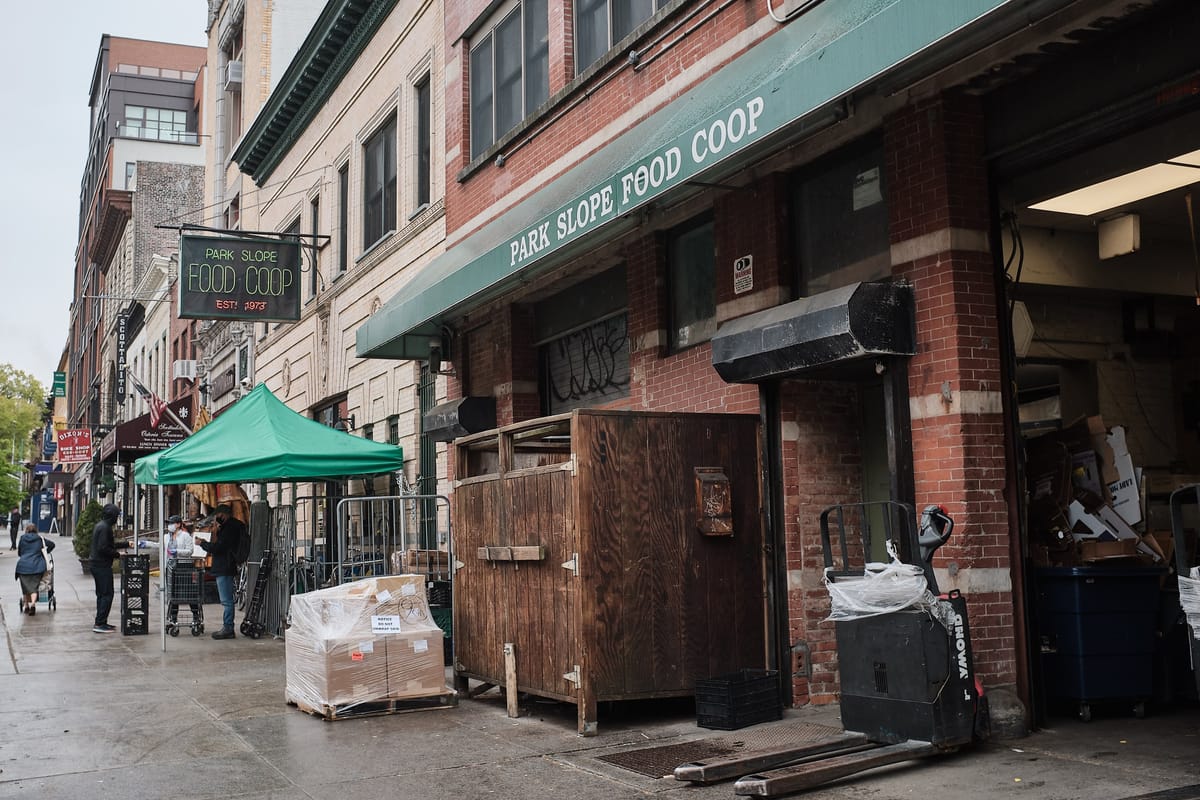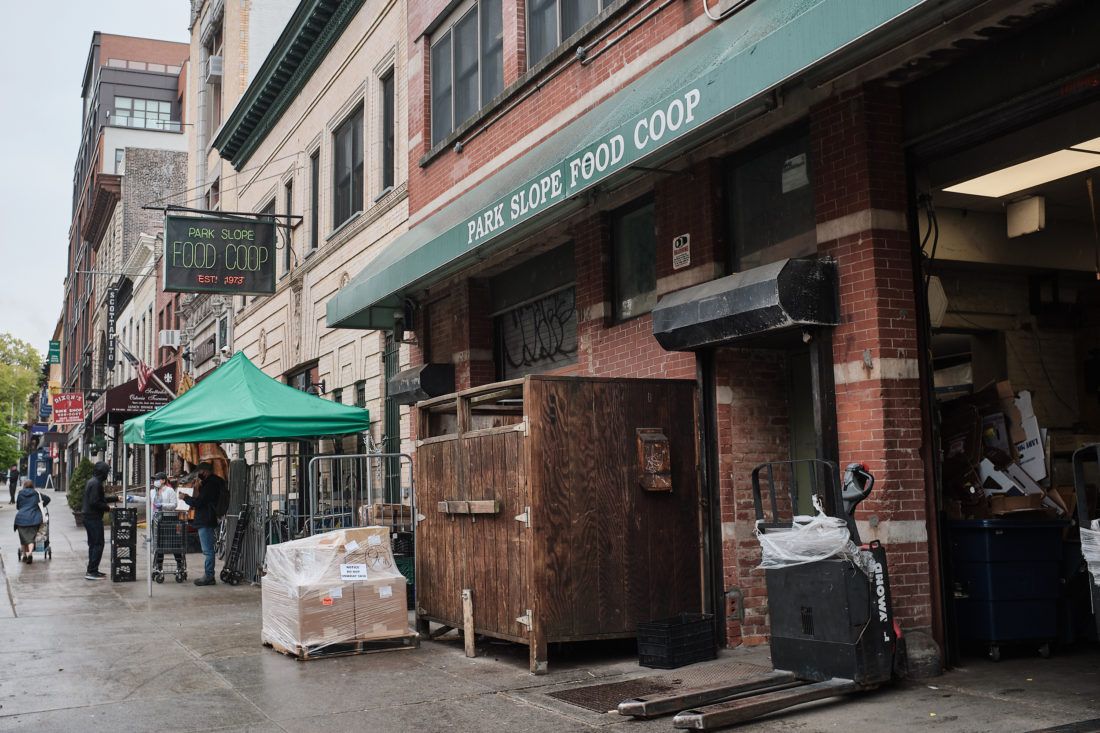Park Slope Food Coop Depends On Its 17,000 Member-Owners To Weather The Pandemic


Park Slope Food Coop members may not be able to shop like they used to, but the grocery is in a stronger position to weather the pandemic because it can depend on them. The fabled low-priced grocery store is asking their 17,000 owner-members to pitch in during tough times by increasing their investment as part-owners.
The normally packed 6,000 square foot store is now restricted to only having a scant 35 members shop at a time.
Jobs normally worked by the store’s 17,000 members, like stocking, cleaning, packing food and checkout registers, have been filled by 55 temporary paid workers to reduce the risk of transmitting COVID-19. Most of the workers are co-op members who now work full-time to keep the operation running.
Fewer shoppers and more paid labor have taken a major bite out of the co-op’s finances: weekly sales cut nearly in half, from about $1.1 million to $600,000, and an additional $20,000 added to their weekly payroll. This totals a reduction of about $110,000 in the co-op’s bank account per week, according to an April 12 report to members from General Manager and Co-founder of the co-op Joe Holtz.
“We started this year with more than $3.9 million dollars in the bank,” Holtz wrote in his report, saying that if business remains the same through mid-August, it would bring their bank balance down to roughly $500,000.
“This is not a sustainable amount for running a cooperative that is this size,” Holtz wrote.
While the co-op has applied for loans from the Small Business Administration and a line of credit from their bank, the store has an additional pool of support: its die-hard members.
All of the Park Slope Food Coop 17,000 members are part-owners. When joining, in addition to a non-refundable $25 fee, members contribute $100 as an equity investment, which is returned to them upon ending their membership.
Donations are considered taxable income to the co-op, but “increased member investments remain as an asset for each member and therefore are not income for the Coop,” writes Holtz in his report. The money is not interest bearing and members may withdraw their excess investment at any time, according to Holtz.
Increasing member investments is not unprecedented – it occurred when the co-op sought to expand to neighboring buildings – and provides a unique opportunity to help endure the uncertain months ahead.
“It’s a tremendous strength,” said Ann Herpel, a general coordinator at the co-op who has worked there for nearly 20 years, “that you have these member owners who understand the nature of cooperatives and that they have an ownership stake so they have an interest in its financial stability and that might involve more money from them.”
Members have been quick to invest in the future of their beloved co-op. In the three weeks after Holtz’s report, the co-op already saw an increase of $139,000 in member equity investments, Herpel said, but much more money is needed to ensure the co-op stays financially sound.
“We have to have a deeper capital reserve than we did just because it could be a year in which we’re on a roller coaster ride,” said Herpel.
Alexandra Schwartz, a staff writer at the New Yorker, wrote a much talked about 7,000 word story on the Park Slope Food Coop for the magazine last fall. A member since 2013 (she works the checkout shift), Schwartz has been back to shop a handful of times since mid-March.
“The co-op lives and dies by its members,” she said in a phone interview, “And in normal times, that means that we all show up to do our shift once a month. We contribute our labor to the co-op and we reap these enormous rewards of better food for less money.”
After learning about the co-op’s need for cash, she decided to triple her initial member investment on a recent shopping trip.
“I’m so glad to be able to do something for the co-op when I can’t actually provide labor for them,” she said.
Another member, Simone Rutkowitz, a program manager at Columbia University, heeded the call as soon as she was able to. She’s currently helping her parents living just north of the city, but in the time before COVID-19, you could find her working extra shifts at the co-op simply because she enjoyed being there.
“There was no question in my mind that I was going to add to my investment,” she said.
Rutkowitz also shared Holtz’s report with other co-op members in her life, including Sarah Meredith, who has also been out of the city.
Meredith, 65, has been a member for over 20 years and felt annoyed to learn of this dire financial news from a member and not directly from the co-op, but as soon as her $1200 federal stimulus check arrived, she sent it back to Brooklyn.
“I don’t feel like an owner,” she said of increasing her investment, “it’s like you’re in a family.”
Not every member is able to increase their member equity investment.
Alyson Metzger, a freelance writer and editor, just spent the last two years undergoing cancer treatments, which hit her hard financially. She’s not doing her shopping in person and grocery delivery services are far more expensive than the deals she’s grown to love at the co-op.
“I miss it more than anything,” she said via a Twitter direct message. “The co-op is truly the biggest loss for me. It got me through cancer, the quality food,” she wrote, “and [it was] often my only outing and community.”
Laura Sitkin worked side by side with Metzger for years at the checkout line. They’ve since become good friends outside of the co-op. Sitkin is helping to do some shopping for Metzger, buying organic meats and low-priced cheeses for her friend as she shops for her husband and two children.
Sitkin has been a member for about six years and doesn’t know what she would do without the co-op, citing it as a crucial and inexpensive place for her to feed her family with healthy food.
Even her kids love going to the co-op, sometimes asking her if they can “go to that playroom,” referring to the second-floor childcare room that the co-op offers to members so they can shop kid-free.
Sitkin has a steady income, so she’s planning on adding a little bit to her member equity investment each time she shops. When thoughts of leaving New York come up, she realizes that she can’t bear to be somewhere where the co-op isn’t. If the store closed, “it would make that decision easier for me, actually,” she said.
“There’s a lot of reasons to live in New York and most of them I can’t afford to participate in,” Sitkin said, “but the food coop is the opposite. It makes my life here more affordable. I can’t imagine living here without it.”
“It’s just a unique and wonderful place. I would be GUTTED if we lost it,” Metzger wrote in her DM. “I miss shopping. I miss working.”
Note: The author has been a member of the Park Slope Food Coop since 2016




